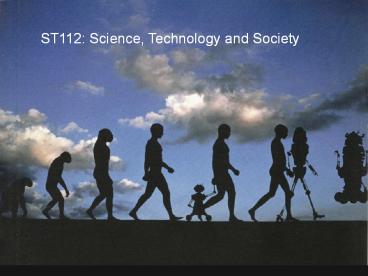Welcome to ST 112 Science, Technology, and Society - PowerPoint PPT Presentation
Title:
Welcome to ST 112 Science, Technology, and Society
Description:
Science dynamics Technological dynamics ... R&D, invention, patronage, mass production and ... Welcome to ST 112 Science, Technology, and Society Last ... – PowerPoint PPT presentation
Number of Views:322
Avg rating:3.0/5.0
Title: Welcome to ST 112 Science, Technology, and Society
1
ST112 Science, Technology and Society
2
- http//www.colby.edu/sts
- http//www.colby.edu/sts/st112_2010
- What is STS?
- Defining Science and Technology
3
Science, Technology and Society (STS)
- The intellectual roots of STS lie in the history,
philosophy, and social study of science and
technology, an arena where often-controversial
issues and choices interface with values and
influence public policy. STS prepares students to
understand both the technical and social
dimensions of science and technology, helps them
become more thoughtful and better-informed
citizens of our high-tech society, and develops
their critical interdisciplinary thinking,
research, and communication skills. Students
flourish intellectually in an environment where
critical questioning is encouraged and
opportunities for research are abundant. The STS
program maintains a full slate of guest speakers,
often co-sponsored by other departments, for the
benefit of students and the larger community.
4
On a personal level, STS is
- Interdisciplinary education for life.
- Relevant to every field of study.
- A great major or double major or the minor for
all majors. - A way to improve your writing and communications
skills, problem-solving abilities, and ability to
adapt to changes in science and technology. - Attractive to potential employers.
- Needed at all levels, in education, government,
the private sector, and internationally.
5
STS is
- Interdisciplinary study of the interaction of
science and technology with society and culture. - The realization that discoveries and inventions
are shaped by historical forces and in turn
influence values, aspirations, events, and
institutions, thus shaping the course of history. - S and T in social and cultural context.
- Both academic and activist.
6
ACADEMIC STS
- Scholarly Study of Science and Technology.
- History, Philosophy, Sociology of S T.
- Interdisciplinary and multidisciplinary.
- Perennial and structural problems of history,
philosophy, and human nature. - Science dynamics
- Technological dynamics
- Informs activist STS issues.
7
ACTIVIST STS
- Gets involved in current issues.
- Covers a broad social spectrum (not just
academic). - Builds coalitions
- 1. Awareness of a problem
- 2. Need to take responsibility
- 3. Draw on external expertise
- 4. Make decisions and take actions
- (demonstrate, litigate, educate, legislate,
etc.). - Strengths relevance, empowerment, democratic.
- Weaknesses ad hoc, emotional, NIMBY.
- Examples nuclear power, toxic wastes, health
care, climate change action.
8
The Two Cultures
9
What does it mean to be human?Two Possibilities
- Homo sapiens sapiens
- Primates who think (a lot)
- Contemplative
- Homo farber
- Primates who make things
- Manipulative
10
Science is. . .
- Natural knowledge
- Natural philosophy
- Natural history
- Systematic inquiry into nature
- A human cultural activity
- A total societal enterprise
- With vast social consequences
- Organized, well-founded knowledge of nature and
human nature - A sophisticated intellectual version of
Esperanto or the universal language that the
heroes of the scientific revolution imagined as
an instrument of global communication - The cutting edge of ignorance
11
How do we define science?
- CONTENT Body of organized knowledge about nature
From Latin scientia - knowledge - METHOD Of obtaining that knowledge, experiment,
observation, hypothesis, theory, law - ATTITUDE Organized and systematic skepticism
- GOALS Explanation, understanding, prediction,
control - LANGUAGE Mathematics and technical vocabulary
- TOOLS Uses Instruments and technologies
- COMMUNITY Discipline, education, credentials,
careers, patrons, societies, turf - PROCESS Organized, but very diverse activity
shaped by social forces and historical change
12
In general
- Science is an organized, hierarchical activity
that investigates nature and human nature by
experiment and observation. - Its goals are explanation, understanding,
prediction, and control. - It tests its theories by logical, mathematical,
and technological means. - Science is shaped by social forces and historical
change. - While seeking objectivity, science also shapes
culture.
13
Stereotypes
Newton, John Hershel, Darwin
14
Stereotypes
15
Technology
- a. Artifacts or Hardware. Products fabricated by
humans to meet specific needs. Tools, machines,
implements. - b. Knowledge and Methods. A system of tacit and
explicit knowledge, techniques, and materials
utilized in using, making, or repairing a certain
kind of artifact. - c. A human cultural activity or profession. e.g.
military or civil engineers, crafters,
machinists. - d. A total societal enterprise. e.g. American
technological know-how. RD, invention,
patronage, mass production and mass consumption.
16
What is Technology?
- A discourse or treatise on an art or arts
- The scientific study of the practical or
industrial arts. - Techne (art, craft, skill), Logos (word).
- Some other attempts at definitions
- A system based on the application of knowledge,
manifested in physical objects and organizational
forms, for the attainment of specific goals
Volti - Cumulative sum of means used to satisfy human
needs and desires and to solve specific problems
Markert - The sum total of systems of machines and
techniques that underlie a civilization Nye - Not merely a system of machines with certain
functions, but an expression of a social world
Nye - The production of superfluities today as in the
Paleolithic age Ortega y Gasset - The seeping false-hearted death DeLillo
17
Technologies of the PastTECHNOSPHERES
18
AssignmentBe ready to discuss Technology
Matters chapters 1-3.Can we define
Technology?Does Technology control us?Is
Technology predictable?Hand in Think Piece 1































